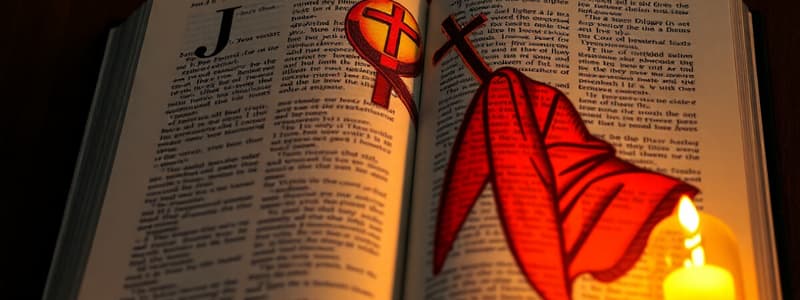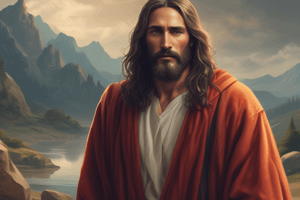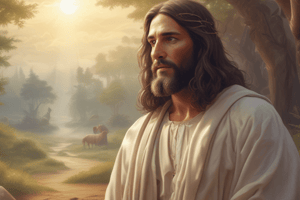Podcast
Questions and Answers
Which of the following actions did Constantine supposedly undertake after his heavenly vision?
Which of the following actions did Constantine supposedly undertake after his heavenly vision?
- He initiated a program to persecute Christians within his empire.
- He mandated the inclusion of Old Testament stories in military training.
- He ordered the construction of a grand temple dedicated to pagan gods.
- He ordered his soldiers to place the sign of the cross on their shields. (correct)
Who is credited with helping to establish Christianity in Ireland?
Who is credited with helping to establish Christianity in Ireland?
Magonus Sucatus Patricius
Scholastic theology is considered the intellectual landmark of the Middle Ages.
Scholastic theology is considered the intellectual landmark of the Middle Ages.
True (A)
Which theological work is Thomas Aquinas best known for?
Which theological work is Thomas Aquinas best known for?
The __________ is the Greek translation of the Old Testament.
The __________ is the Greek translation of the Old Testament.
In what year did the destruction of the Second Jewish Temple occur?
In what year did the destruction of the Second Jewish Temple occur?
Match the tenet to the correct religion or philosophy:
Match the tenet to the correct religion or philosophy:
According to Marcion, how did the God of the Old Testament primarily relate to humanity?
According to Marcion, how did the God of the Old Testament primarily relate to humanity?
Which of the following best describes the early Christian attitude toward elements of Greek culture?
Which of the following best describes the early Christian attitude toward elements of Greek culture?
The early church was known for its care of widows and orphans.
The early church was known for its care of widows and orphans.
Which of the following figures did NOT approve of Greek philosophy within the early church?
Which of the following figures did NOT approve of Greek philosophy within the early church?
Which Roman emperor blamed Christians for the devastating fire in Rome?
Which Roman emperor blamed Christians for the devastating fire in Rome?
The Edict of Milan, enacted by Constantine, is most significant for what reason?
The Edict of Milan, enacted by Constantine, is most significant for what reason?
Which of the following was NOT a reason Romans persecuted Christians?
Which of the following was NOT a reason Romans persecuted Christians?
The Arians believed that Christ was of the same substance as God the Father.
The Arians believed that Christ was of the same substance as God the Father.
Name the three Cappadocian Fathers.
Name the three Cappadocian Fathers.
Roman persecution of Christians was typically systematic and empire-wide.
Roman persecution of Christians was typically systematic and empire-wide.
Which of the following best summarizes the Apologists' response to persecution?
Which of the following best summarizes the Apologists' response to persecution?
___________ completed the Latin translation of the Bible known as the Vulgate.
___________ completed the Latin translation of the Bible known as the Vulgate.
Match the following terms with their descriptions in the context of early Christian persecution:
Match the following terms with their descriptions in the context of early Christian persecution:
Match the following contributions with their associated theologian:
Match the following contributions with their associated theologian:
Which of the following was NOT a factor in the rise of the papacy?
Which of the following was NOT a factor in the rise of the papacy?
The Byzantine Empire was centered in Rome.
The Byzantine Empire was centered in Rome.
Which of the following events occurred on Christmas Day in 800 C.E.?
Which of the following events occurred on Christmas Day in 800 C.E.?
Flashcards
Constantine's Vision
Constantine's Vision
Emperor Constantine saw a heavenly vision prompting him to place the cross on soldiers' shields.
Saint Patrick
Saint Patrick
Magonus Sucatus Patricius, known as St. Patrick, helped establish Christianity in Ireland.
Anselm's Motto
Anselm's Motto
Anselm's motto was 'Faith seeking understanding.'
Scholastic Theology
Scholastic Theology
Signup and view all the flashcards
Summa Theologiae
Summa Theologiae
Signup and view all the flashcards
Septuagint
Septuagint
Signup and view all the flashcards
Tenets of Gnosticism
Tenets of Gnosticism
Signup and view all the flashcards
Responses to Canon Heresy
Responses to Canon Heresy
Signup and view all the flashcards
Edict of Milan
Edict of Milan
Signup and view all the flashcards
Constantine
Constantine
Signup and view all the flashcards
Council of Nicea
Council of Nicea
Signup and view all the flashcards
The Arians
The Arians
Signup and view all the flashcards
Capadocian Fathers
Capadocian Fathers
Signup and view all the flashcards
Vulgate
Vulgate
Signup and view all the flashcards
Augustine's contributions
Augustine's contributions
Signup and view all the flashcards
Charlemagne's coronation
Charlemagne's coronation
Signup and view all the flashcards
Early Church Care
Early Church Care
Signup and view all the flashcards
Approval of Greek Philosophy
Approval of Greek Philosophy
Signup and view all the flashcards
Emperor Nero's Blame
Emperor Nero's Blame
Signup and view all the flashcards
Reasons for Persecution
Reasons for Persecution
Signup and view all the flashcards
Systematic Persecution
Systematic Persecution
Signup and view all the flashcards
Apologists' Response
Apologists' Response
Signup and view all the flashcards
Categories of Persecution
Categories of Persecution
Signup and view all the flashcards
Characteristics of Martyrs
Characteristics of Martyrs
Signup and view all the flashcards
Study Notes
Exam 1 Study Guide - THEO 110
-
Ways Christians think about Jesus:
- Tells and shows what God is like
- Makes new relationships with God possible
- Acts like a model of the life of faith
-
Roman historians' points about Jesus:
- Jesus was condemned to death by Pontius Pilate
- By Nero's death, Jesus had many followers blamed for the fire
- By AD 112, Christians worshipped Jesus "as if he was a god" and abandoned Roman emperor worship
-
Christianity & Death of its Founder:
- Christianity is the only major faith focusing on its founder's death.
- True
-
Precise Date of Jesus' Birth:
- The precise date of Jesus' birth is not a significant issue for Christians.
- False
-
Jesus' Teachings on God's Kingdom:
- Most of Jesus' teachings about the Kingdom of God are expressed in parables.
- True
-
Main Elements of Gospel Resurrection Narratives:
- The tomb was empty after 3 days
- Disciples reported personal encounters with Jesus
- Disciples began to preach Jesus as the living Lord rather than a dead teacher
-
New Testament Titles of Jesus:
- Messiah
- Lord
- Son of God
-
First Human Witnesses to the Resurrection:
- The first human witnesses to the resurrection were women.
- True
-
Early Christianity's Recognition:
- Early Christianity was not officially recognized in the Roman Empire as a religion.
- False
-
Emperors Responsible for Christian Persecution:
- Nero
- Domitian
- Trajan
- Marcus
- Septimus
- Decius
- Valerian
- Diocletian
-
Emperor's Heavenly Vision:
- Constantine saw a heavenly vision ordering him to place the sign of the cross on his soldiers' shields.
-
Anselm's Motto:
- Faith seeking understanding
-
Scholastic Theology:
- Scholastic theology is not considered the intellectual landmark of the Middle Ages.
- False
-
Famous Scholastic Theology Work:
- Thomas Aquinas wrote the Summa Theologica, considered the most famous work of Scholastic theology.
-
Septuagint:
- The Septuagint is a Greek translation of the Old Testament.
-
Destruction of the Second Jewish Temple:
- The destruction of the Second Jewish Temple occurred in 70 C.E.
-
Tenets of Gnosticism:
- The physical world is a mistake and a prison
- True reality is spiritual
- Salvation is through knowledge
- Jesus only appears to be human.
-
Early Church Leaders (the College of Elders):
- This group developed from the college of elders and became the leaders of the early church.
-
Marcion's Belief:
- Marcion believed the Old Testament God was only concerned with justice.
-
Responses to Heresy:
- Establishing which books have divine authority
- Tracing current bishops back to the original apostles
- Faith is passed down through generations.
- A creed, which is a statement of faith that includes basic doctrines.
-
Greek Culture & Early Christians:
- No to theater, athletic contests, military, and government
- Radical sense of egalitarianism.
- Care for widows, orphans, and the poor.
- Response to slavery
-
Who Approved and Disapproved of Greek Philosophy:
- Some figures approved and others did not approve of incorporating Greek philosophy into the church.
-
Emperor Blamed for Roman Fire:
- Emperor Nero blamed Christians for a fire that devastated Rome.
-
Reasons for Roman Persecution:
- Christianity was an illegal religion
- Christians were atheists and idiots
- Christians were criminals
- Christians were bad citizens
- Christians eat babies
-
Roman Persecution:
- Roman persecution was not systematic and empire-wide.
- False
-
Apologetics Response to Persecution:
- Ask for fair treatment
- Criminal activity is against Christian teaching
- We are desirable citizens
- Greek philosophy supports an invisible, supreme God
- Christians pray for the Empire
-
Two Categories Created by Persecution:
- Martyrs (spiritual superheroes)
- Confessors (tortured, but not killed)
-
Edict Ending Persecution:
- The Edict of Milan brought an end to the persecution of Christians.
-
First Christian Emperor:
- Constantine.
-
Constantine's Impact on the Church:
- A surge in popularity
- Prestige of bishops
- Increase in wealth.
-
Council Called by Constantine:
- The Council of Nicea was called by Constantine and declared Christ as the same substance as God the Father.
-
Group Declaring Christ Subordinate:
- The Arians believed Christ was a subordinate being to God the Father.
-
Cappadocian Fathers:
- Basil of Caesarea, Gregory of Nazianzus, Gregory of Nyssa
-
Athanasius:
- A tireless defender of the Council of Nicea and the concept of homoousios (consubstantial).
-
Latin Translation of the Bible:
- Jerome completed the Vulgate, a Latin translation of the Bible.
-
Augustine's Contributions:
- Development of Imago Dei theology.
- Just war theology
- Original Sin
- Denial of imperial theology
- Doctrine of purgatory
- The sacraments — ex opere operato
- Theology that echoes throughout the Middle Ages.
-
Factors in Rise of Papacy:
- Initial factors include location, double apostolic foundation, model for apostolic succession, bold claims (e.g., Easter controversies).
-
Veneration of Icons:
- Veneration of icons was important in Eastern Christianity.
- True
-
Byzantine Empire Center:
- The Byzantine Empire was centered in Constantinople.
-
Bridging Early and Medieval Church:
- Gregory the Great successfully bridged the early and medieval church.
-
Pippin and Pope Zachary's Alliance:
- Pippin was able to form an alliance with Pope Zachary.
- False
-
Charlemagne's Coronation:
- Charlemagne was crowned on Christmas, 800 C.E. by Leo III.
-
Carolingian Renaissance Characteristics:
- Secular matters such as interest in education, scientific investigation and early universities
- Church matters such as Sundays off (mandatory attendance), tithe through taxes.
- Poor person's Bible, preaching in vernacular, appoint and remove bishops.
-
Education in Middle Ages:
- Education in the Middle Ages was limited to a few, with most people unable to read.
- False
-
Reasons for East-West Split:
- Language barrier
- Papal claims on universal authority
- Claims of the emperor (Caesaro-Papism)
- Married clergy vs. single clergy
- Leavened bread vs. unleavened bread
- Salvation: justification or deification
- Christian trinity
-
First Crusade Preacher:
- Urban II led the first Crusade.
-
Conquering Constantinople Crusade:
- The fourth Crusade conquered Constantinople.
-
Franciscans' Goal:
- The Franciscans initially focused on complete poverty as a goal.
-
Dominicans Founded:
- The Dominicans were founded to evangelize the poor and heretics.
-
Scholastic Tradition:
- The scholastic tradition began in Europe.
-
Scholastics' Considerations:
- Scholastics considered the relationship between faith and reason in their teachings.
-
Investiture Ceremony:
- Investiture is a ceremony whereby power is given to a subordinate.
- True
-
Bishop Appointments:
- The appointing of a bishop was often an issue between kings and popes in the feudal era.
- False
-
Pope Refusing Election:
- Pope Leo IX refused to be elected by Henry III and insisted on being elected by the Roman people.
-
High Point of Papal Power:
- Pope Innocent III is considered the high point of Medieval papal power.
-
King Exercising Papal Power:
- A king was able to exert authority over Pope Boniface VIII.
-
Papacy Residence:
- The papacy resided in Avignon from 1307 to 1377.
-
Conciliar Theory:
- The conciliar theory holds that the papacy is subordinate to a general council.
- False
-
Council Ending Papal Conflicts:
- The Council of Constance brought an end to the simultaneous rule of three popes.
Studying That Suits You
Use AI to generate personalized quizzes and flashcards to suit your learning preferences.




